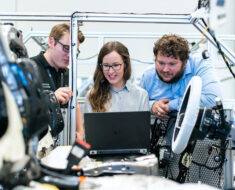
NRC Grapes
In analytical chemistry, Inductively Coupled Plasma Mass Spectrometry (ICP-MS) instruments have revolutionized how we analyze and measure trace elements in various samples. Their unique capabilities, sensitivity, and accuracy have driven technological innovation across multiple fields.
This blog article explores the impact of ICP MS instruments on scientific advancements, environmental monitoring, pharmaceutical research, and materials science. By delving into these areas, we can better understand how these instruments have shaped and will continue to shape our world.
Advancements In Scientific Research
ICP-MS instruments have played a pivotal role in scientific research, enabling scientists to study the composition and behavior of elements with unprecedented precision. These instruments have allowed the discovery of new features and isotopes, leading to advancements in nuclear physics and chemistry.
Additionally, ICP-MS has facilitated breakthroughs in geology, archaeology, and forensic science, where trace element analysis is crucial. The ability to accurately measure isotopic ratios and trace metal concentrations has unraveled mysteries and provided valuable insights into Earth’s history, human origins, and criminal investigations.
Environmental Monitoring And Conservation
ICP-MS instruments have become essential tools in environmental monitoring and conservation efforts. They enable scientists to measure trace elements and pollutants in air, water, and soil, providing critical data for environmental assessments. Researchers can track the presence and sources of heavy metals, toxins, and other harmful substances by analyzing samples collected from different regions.
This information aids in formulating effective strategies for pollution control, remediation, and policy development. Moreover, the continuous advancements in ICP-MS technology have enhanced sensitivity and reduced detection limits, enabling the detection of minute amounts of contaminants that were previously undetectable.
Pharmaceutical Research And Drug Safety
ICP-MS instruments have significantly contributed to the development and safety assessment of pharmaceuticals. They facilitate elemental analysis of drug formulations, ensuring the accuracy of ingredients and detecting impurities that may impact efficacy or pose health risks. ICP-MS can detect trace metals in drug products and provide insights into their origin, helping pharmaceutical companies establish stringent quality control measures.
Furthermore, these instruments are employed in studies focused on metal toxicity and bioavailability, enabling researchers to evaluate the safety and potential adverse effects of drug-related elements in the human body.
Advancements In Materials Science And Nanotechnology
ICP-MS instruments have revolutionized materials science and nanotechnology by enabling precise elemental analysis and characterization of materials. Researchers can study the elemental composition and distribution within materials, such as metals, alloys, ceramics, and nanoparticles.
This knowledge is crucial for optimizing material properties, improving manufacturing processes, and ensuring product quality. ICP-MS also plays a vital role in nanotoxicology, helping scientists evaluate the potential risks associated with nanomaterials and understand their behavior in various environments.
Conclusion
ICP-MS instruments have profoundly impacted various scientific fields, driving technological innovation and expanding our understanding of the world around us. From scientific research to environmental monitoring, pharmaceutical development, and materials science, the sensitivity and accuracy of ICP-MS instruments have enabled breakthroughs and informed critical decision-making. As these instruments continue to advance, we can expect further progress and new applications that will shape the future of analytical chemistry and scientific exploration, leading to a safer, healthier, and more sustainable world.









































